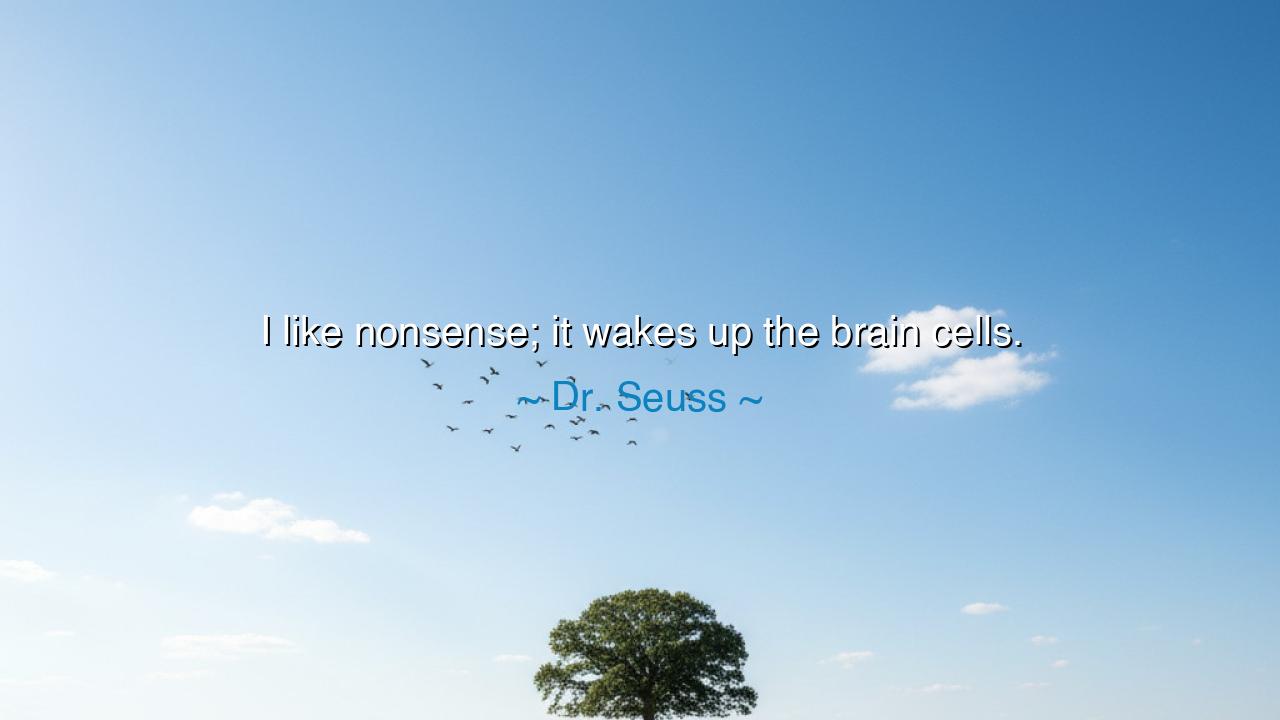
I like nonsense; it wakes up the brain cells.






“I like nonsense; it wakes up the brain cells.” Thus spoke Dr. Seuss, the joyful sage of childhood, whose words danced like stars in the minds of the young and the weary alike. Yet behind this simple jest lies a truth of ancient depth — that nonsense is not chaos, but the spark that frees the mind from its slumber. It is the sacred disorder that shakes the dust from thought, the laughter that breaks the chains of dull reason. Dr. Seuss, though clothed in whimsy, was a philosopher of freedom; he knew that imagination, like a sword, must be kept sharp by play.
In ages past, the ancients too revered the power of the absurd. They told riddles not merely to confuse, but to awaken. They painted myths where gods turned into beasts, stars became lovers, and rivers spoke — for through nonsense, the human soul learned to see what logic could not. For what is nonsense, if not the rebellion of the spirit against the tyranny of the ordinary? It is the mind daring to dance in the rain of possibility, to make meaning where there was none, and in doing so, to glimpse the divine.
When Dr. Seuss spoke of waking up the brain cells, he spoke of the renewal of wonder — that moment when the mind, weary with routine, suddenly laughs, and in that laughter, awakens. The human brain, like a garden, withers in sameness but blossoms in surprise. Nonsense is the rain of the unexpected that nourishes creativity. It invites the child back into the heart of the adult, reminding us that wisdom is not the absence of play, but its perfection. The fool who sees truth through laughter is wiser than the scholar who sees only the structure of the world.
Consider the tale of Albert Einstein, who once said, “Imagination is more important than knowledge.” When others labored under the strict laws of science, he let his mind play with nonsense — chasing beams of light as if he were a child running through the sky. He imagined clocks stretching, time bending, and space curving — ideas that sounded absurd, even mad. Yet from that seeming nonsense, a new reality was born: the theory of relativity. What was laughter to one generation became revelation to the next. Thus we see that nonsense, in the hands of the brave, is the seed of discovery.
Even in the lives of artists and poets, nonsense is sacred fire. When the world demands sense and order, the poet dares to dream in riddles. Van Gogh painted stars that swirled like souls; Lewis Carroll led children down rabbit holes where time ran backward; and Seuss himself filled his pages with creatures that defied all logic — yet in their nonsense, they taught truths deeper than reason. For the heart learns not only through what makes sense, but through what makes it feel. Nonsense opens the gates of emotion, and emotion opens the gates of understanding.
Beware, however, the mind that fears nonsense. For such a mind has already begun to decay. The over-serious, who build walls of logic around themselves, forget that all wisdom begins in wonder, and all wonder begins in the unknown. To reject nonsense is to reject mystery — to close the door on growth. The ancients said that the gods hide truth behind paradox, so that only the curious and the humble may find it. And so, to love nonsense is to bow before the mystery of creation itself.
The lesson, then, is radiant and joyful: embrace nonsense. Let your thoughts play as children play — freely, without fear of failure or mockery. Laugh at absurdity, for in laughter lies liberation. When you are too weary to think, let nonsense guide you to imagination’s spring. Try what seems foolish, for from folly is born invention. Let your speech sometimes rhyme, your thoughts sometimes wander, your ideas sometimes clash — for in such chaos lies creation.
And remember, my child of sense and dream alike: the world will always seek order, but it is nonsense that breathes life into order. As Dr. Seuss knew, laughter is not escape — it is awakening. So wake up your brain cells; let them dance to the music of absurdity. For in that joyous noise, you will find not madness, but wisdom — not foolishness, but freedom.






AAdministratorAdministrator
Welcome, honored guests. Please leave a comment, we will respond soon